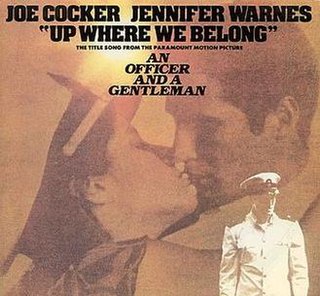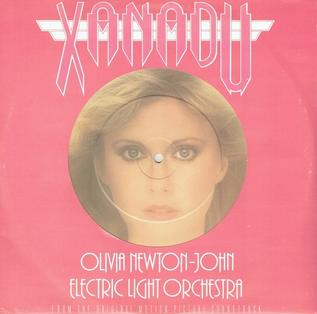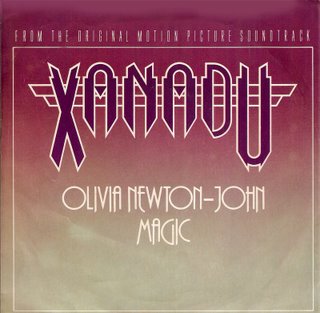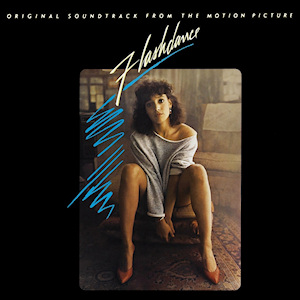Related Research Articles

Saturday Night Fever is the soundtrack album from the 1977 film Saturday Night Fever starring John Travolta. The soundtrack was released on November 15, 1977. It is one of the best-selling albums in history, and remains the second-biggest-selling soundtrack of all time, after The Bodyguard, selling over 40 million copies worldwide.
John Cafferty & The Beaver Brown Band is an American rock band from Rhode Island which began its career in 1972, and achieved mainstream success in the 1980s. Originally known as simply Beaver Brown, they got their name from a paint can. The classic lineup of the group started out as a New England bar band based in Narragansett, Rhode Island and established a following up and down the Northeast corridor with strongholds in the beach resort towns of Narragansett and Misquamicut, Rhode Island; New York City; New Haven, Connecticut; Boston, Massachusetts; and Asbury Park, New Jersey.

"Up Where We Belong" is a song written by Jack Nitzsche, Buffy Sainte-Marie and Will Jennings that was recorded by Joe Cocker and Jennifer Warnes for the 1982 film An Officer and a Gentleman. Warnes was recommended to sing a song from the film because of her previous soundtrack successes, and she had the idea for the song to be a duet that she would perform with Cocker. Jennings selected various sections of the score by Nitzsche and Sainte-Marie in creating the structure of the song and added lyrics about the struggles of life and love and the obstacles that people attempt to dodge. It was released in July of that year to coincide with the release of the film.

Grease: The Original Soundtrack from the Motion Picture is the original motion picture soundtrack for the 1978 film Grease. It was originally released by RSO Records and subsequently re-issued by Polydor Records between 1984 and 1991. It has sold over 30 million copies worldwide, making it one of the best-selling albums of all time, also ranking amongst the biggest selling soundtrack albums of all time. The song "You're the One That I Want" was a US and UK No. 1 for stars John Travolta and Olivia Newton-John.

"Xanadu" is the title song from the soundtrack of the 1980 film Xanadu. Written by Jeff Lynne of the English rock band Electric Light Orchestra (ELO), the song is performed by English-born Australian singer, songwriter and actress Olivia Newton-John, with Lynne adding parenthetic vocals in the style of his other songs on the Xanadu soundtrack, and ELO providing the instrumentation. It is Lynne's favourite song of the ones he has written. "Xanadu" reached number one in several countries and was the band's only UK number-one single, when it peaked there for two weeks in July 1980. It was certified Silver by the British Phonographic Industry. It also peaked at number eight on the US Billboard Hot 100.

"Twilight Zone" is a 1982 hit by Dutch band Golden Earring. It was written by the band's guitarist George Kooymans, who got the inspiration from a book by Robert Ludlum, The Bourne Identity. "Twilight Zone" appears on their 1982 album Cut and pays tribute to the 1960s television series The Twilight Zone. It spent more than half a year on the U.S. Pop charts. It was the group's sole Top 10 Pop single on the US Billboard Hot 100 and hit No. 1 on the Billboard Top Album Tracks chart, the band's only No. 1 hit in America.

"Summer Nights" is a popular song from the musical Grease. Written by Jim Jacobs and Warren Casey, its best-known version was recorded by American actor and singer John Travolta and Australian singer, songwriter and actress Olivia Newton-John for the big-screen adaptation of the musical, and released as a single that same year. It was released in August 1978 as the fourth single from the movie's soundtrack album and became a massive hit worldwide during the summer of 1978. Parts of the song were introduced to a new audience when it was re-released in the 1990s as part of a megamix of several songs from the movie version.

"Maniac" is a song from the 1983 film Flashdance that was written by Dennis Matkosky and its performer, Michael Sembello. The original idea for the song came to Matkosky while watching a news report on a serial killer, which inspired gruesome lyrics that he and Sembello expanded upon after finding a 1980 horror film with the same name. When Flashdance director Adrian Lyne grew attached to the demo of the song used during filming, his music supervisor Phil Ramone requested lyrics more appropriate for their story of a dancer and worked with Sembello to produce a new version for the soundtrack. The new recording was used for a scene in which protagonist Alexandra Owens trains rigorously at home.

"Magic" is a song recorded by British-Australian singer Olivia Newton-John for the soundtrack to the 1980 musical fantasy film, Xanadu. Written and produced by John Farrar, the song was released as the lead single from the album in May 1980. It peaked at number one on the US Billboard Hot 100 for four weeks beginning on August 2, 1980. On August 30, it was displaced from the top by Christopher Cross's "Sailing".

Flashdance: Original Soundtrack from the Motion Picture is the soundtrack to the 1983 film Flashdance, which tells the story of Alex Owens, a welder and exotic dancer who dreams of becoming a professional ballerina. The nightclub performances by Alex and her co-workers and other set pieces involving training and auditioning provided opportunities to present the songs that would make up the soundtrack album. The film's music supervisor, Phil Ramone, made selections that he felt were the best fit for their respective scenes, and composer Giorgio Moroder contributed additional tracks in the process of scoring the film. One of his contributions, "Flashdance...What a Feeling" by Irene Cara, was released as a single in March 1983, weeks before the film's April 15 release, and eventually spent six weeks at number one on the Billboard Hot 100.
"On the Road Again" is a song written and made famous by American country music singer Willie Nelson.

"It Might Be You" is a song with music written by Dave Grusin, and lyrics written by Alan & Marilyn Bergman. It was performed by singer/songwriter Stephen Bishop in the 1982 film Tootsie starring Dustin Hoffman and Jessica Lange. The song was nominated for an Academy Award for Best Original Song in 1983.

Anywhere You Go is the first full-length recording from David Pack, the lead singer for the band Ambrosia. The LP was released in November 1985. Pack wrote five songs himself and co-wrote the other five.
"Suddenly" is a duet performed by Olivia Newton-John and Cliff Richard from the soundtrack Xanadu, and is the love theme from the 1980 film of the same name. It was written and produced by John Farrar.
"Try Again" is a song by American contemporary R&B group Champaign. Released in February 1983 as the only single from their album Modern Heart, this ballad rose through the Billboard Hot 100 chart in April and May, peaking at number 23 in mid-June.

The Owl and the Pussycat is the soundtrack album to the 1970 American film of the same name. It was released by Columbia Records on December 19, 1970 and features dialogue from the film by Barbra Streisand and George Segal recorded over music performed by American band Blood, Sweat & Tears. The album's five tracks were all written by Buck Henry, produced by Thomas Z. Shepard, and later released by Blood, Sweat & Tears in stripped down instrumental versions on their 2013 compilation album Rare, Rarer & Rarest. An 8-track cartridge edition and cassette tape edition of The Owl and the Pussycat was also distributed, featuring four songs instead of five.
The Rock and Roll Over Tour was a concert tour by the American heavy metal group Kiss. It began November 24, 1976 and ended April 4, 1977.
Randall "Randy" Lamar Howard was an American singer, songwriter, guitarist, publisher and producer. His music involved Outlaw country, Traditional country, Old Southern gospel, Blues and Christian Country.
Norman Saleet is an American songwriter, musician, and actor. He is best known for writing Air Supply's 1981 hit "Here I Am". The song was chosen for the band by record producer Clive Davis.

"Remember the Nights" is a song by American new wave band The Motels, which was released in 1983 as the second single from their fourth studio album Little Robbers. The song was written by Martha Davis and Scott Thurston, and produced by Val Garay. "Remember the Nights" peaked at number 36 on the US Billboard Hot 100.
References
- 1 2 "Billboard's Top Single Picks" (PDF). Billboard . Vol. 95, no. 25. June 25, 1983. p. 65. ISSN 0006-2510.
- ↑ Heine, Erik (2016). James Newton Howard's Signs: A Film Score Guide. Rowman & Littlefield. p. 6. ISBN 978-1-4422-5604-0.
- ↑ "Billboard's Top Album Picks" (PDF). Billboard . Vol. 95, no. 26. July 2, 1983. p. 59. ISSN 0006-2510.
- 1 2 Whitburn 2009 , p. 1041
- 1 2 Whitburn 2007 , p. 290.
- ↑ Twilight Zone: The Movie (CD booklet). Jerry Goldsmith. Los Angeles: Film Score Monthly. 2009. Vol. 12, No. 7.
{{cite AV media notes}}: CS1 maint: others in cite AV media (notes) (link)